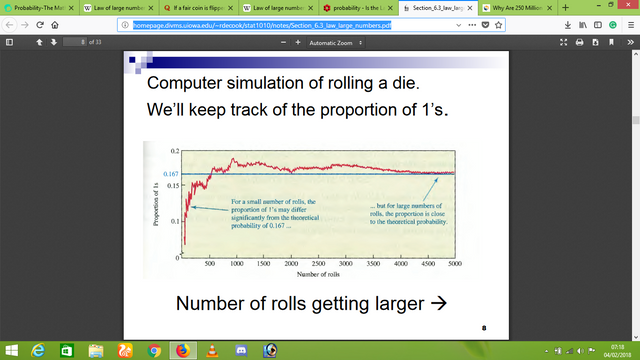You are viewing a single comment's thread from:
RE: Probability-The Mathematics that decides Life (A Brief Research Article)
This statement is incorrect
BIRTH OF A GIRL IN MOSCOW WILL INCREASE THE CHANCE OF BIRTH OF A BOY IN NEW-YORK
Suppose again the coin experiment and flip the coin 4 times. Suppose you would get heads on your first three flips. Then the probability to get a heads on your fourth flip remains 1/2. It does not increase.
Of course the probability that you will get 2 heads over four flips is higher than 3 heads over four flips since in this statement a specific order is not assigned (for example assigning an order would be saying the first 3 flips are heads and the lasts is tails).
yes you are 100% correct,the probability still remains same 1/2.
.png)
But as i understand,
The Law of Large Numbers states that the average of the results from multiple trials will tend to converge to its expected value (e.g. 0.5 in a coin toss experiment) as the sample size increases. The way I understand it, while the first 10 coin tosses may result in an average closer to 0 or 1 rather than 0.5, after 1000 tosses a statistician would expect the average to be very close to 0.5 and definitely 0.5 with an infinite number of trials.
Image source(http://homepage.divms.uiowa.edu/~rdecook/stat1010/notes/Section_6.3_law_large_numbers.pdf)
yes the chance is 1/2 even after a billion trials are made,but i think we dont have to make infinte numbers of trials to get 1/2 result.we may acheive a closer value to 1/2 in million or billion flips.
Thats a finite number,my intuition told me that if that was case there might be boys only in one country and girls only in other country(small countries) but that is not happenning,the population is roughly even in finite 'n' trails i.e. 7.4 billion.
so i concluded that i should excpect or chance is more to get head in next trail in 1000tail/1000toss than 100tail/100toss.
I drawed the conclusion intuitionally,it might or might not be correct. But
Indeed, the law of large numbers requires that the number of trials go to infinity. But any finite number is an infinite distance removed from infinity. Hence, even for a large amount of trials the law of large numbers cannot be applied. More generally, limiting behaviour is only valid in the limit and nowhere else.
i think i have to do some research in this topic,that there are two pars...one real world problems and other abstract mathematical problems.In abstract mathematical concept there can exist infinty and our preassumption is correct,but in our real world, everything is finite (except fractals lol)so i guess nature have to behave little bit differently to make things work.
you made me think extra because i am not going to be satisfy with your answer(though you are correct),i had grown doubt in me.I will do some extra research and calculation to see whether i am wrong or right from my perspective.I will do some research in some other cases like this birth case by taking help from seniors.Then I will write another post for this.